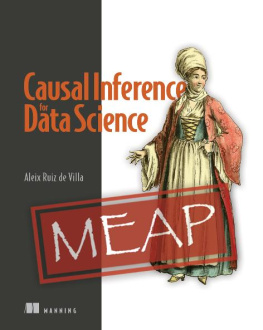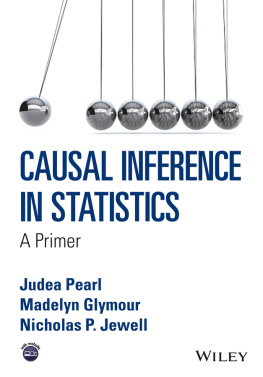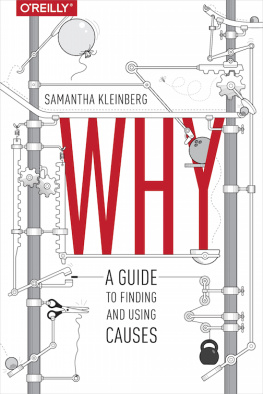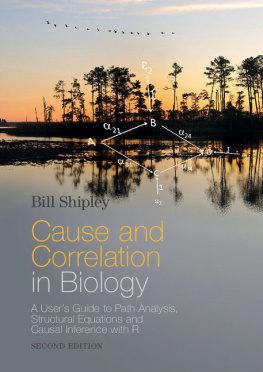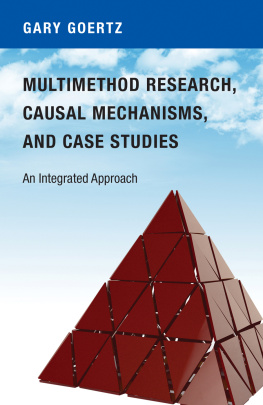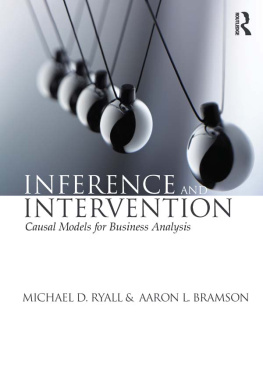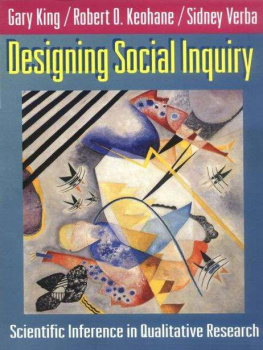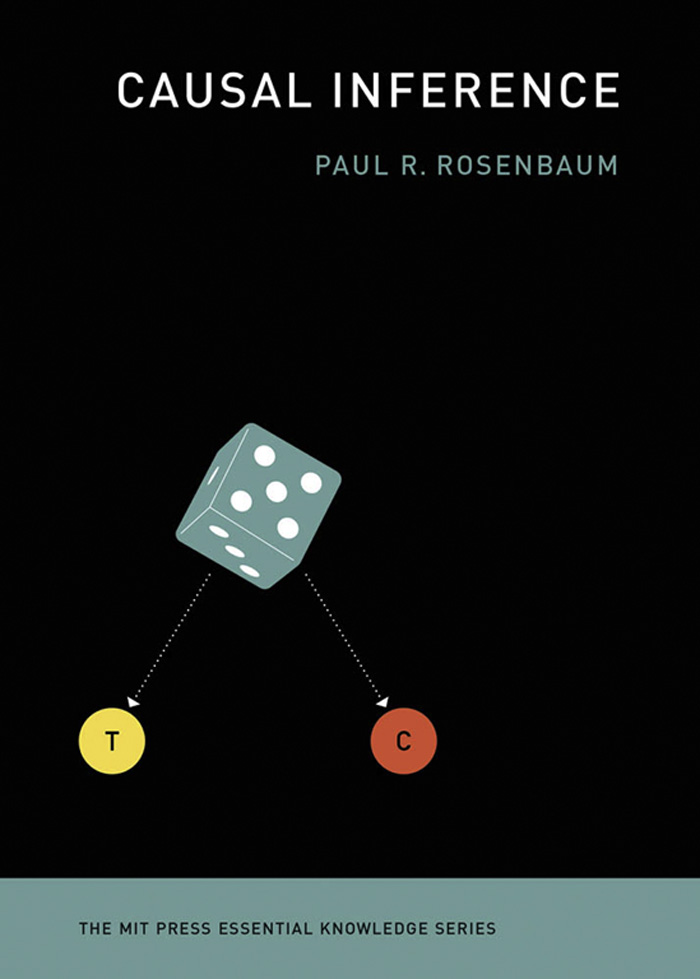
Causal Inference
The MIT Press Essential Knowledge Series
A complete list of books in this series can be found online at https://mitpress.mit.edu/books/series/mit-press-essential-knowledge-series.
Causal Inference
Paul R. Rosenbaum
The MIT Press | Cambridge, Massachusetts | London, England
2023 Massachusetts Institute of Technology
All rights reserved. No part of this book may be reproduced in any form by any electronic or mechanical means (including photocopying, recording, or information storage and retrieval) without permission in writing from the publisher.
The MIT Press would like to thank the anonymous peer reviewers who provided comments on drafts of this book. The generous work of academic experts is essential for establishing the authority and quality of our publications. We acknowledge with gratitude the contributions of these otherwise uncredited readers.
This book was set in Chaparral Pro by New Best-set Typesetters Ltd.
Library of Congress Cataloging-in-Publication Data
Names: Rosenbaum, Paul R., author.
Title: Causal inference / Paul R. Rosenbaum.
Description: Cambridge, Massachusetts : The MIT Press, [2023] | Series: The MIT Press essential knowledge series | Includes bibliographical references and index.
Identifiers: LCCN 2022022398 (print) | LCCN 2022022399 (ebook) | ISBN 9780262545198 (paperback) | ISBN 9780262373531 (epub) | ISBN 9780262373548 (pdf)
Subjects: LCSH: Causation. | ScienceExperiments. | Observation (Scientific method) | Inference. | Probabilities. | Mathematical statistics.
Classification: LCC Q175.32.C38 R663 2023 (print) | LCC Q175.32.C38 (ebook) | DDC 001.4/2dc23/eng20221004
LC record available at https://lccn.loc.gov/2022022398
LC ebook record available at https://lccn.loc.gov/2022022399
10987654321
d_r0
In learning the nature of things, we learn the possibilities of action; in learning the possibilities of action, we learn the nature of things.
Peter F. Strawson, Analysis and Metaphysics
To find out what happens to a system when you interfere with it, you have to interfere with it.
George E. P. Box, Use and Abuse of Regression
Contents
Series Foreword
The MIT Press Essential Knowledge series offers accessible, concise, beautifully produced pocket-size books on topics of current interest. Written by leading thinkers, the books in this series deliver expert overviews of subjects that range from the cultural and the historical to the scientific and the technical.
In todays era of instant information gratification, we have ready access to opinions, rationalizations, and superficial descriptions. Much harder to come by is the foundational knowledge that informs a principled understanding of the world. Essential Knowledge books fill that need. Synthesizing specialized subject matter for nonspecialists and engaging critical topics through fundamentals, each of these compact volumes offers readers a point of access to complex ideas.
List of Examples
- Bleeding George Washington (chapter 1)
- Treatments for Ebola (chapter 2)
- Smoking and periodontal disease (chapters 35)
- Smoking and lung cancer (chapters 3, 5, and 8)
- Lethal side effects of antibiotics (chapter 6)
- The Earned Income Tax Credit and employment (chapter 6)
- Winning the lottery and going bankrupt (chapter 7)
- Housing subsidies and employment (chapter 7)
- Genetic causes of Graves disease, Alzheimers disease, and autism (chapter 7)
- Do unions raise wages? (chapter 7)
- Mindfulness and smoking (chapter 7)
- Clinical treatment of addiction to heroin and cocaine (chapter 8)
- Bringing workplace toxins home to your children (chapter 8)
- Does a glass of red wine lengthen or shorten your life? (chapter 9)
List of Methodological Topics
- Definition of causal effects (chapter 1)
- Randomized experiments (chapter 2)
- Boxplots explained (chapter 3)
- Propensity score (chapters 34)
- Sensitivity analysis (chapter 5)
- Multiple control groups (chapter 6)
- Counterparts (chapter 6)
- Sibling tests (sib-TDT) for genetic causes of disease (chapter 7)
- Parent-child tests (TDT) for genetic causes of disease (chapter 7)
- Instrumental variables (chapter 7)
- Evidence factors (chapter 8)
- Mendelian randomization (chapter 9)
1
The Effects Caused by Treatments
In 1757, before he defeated an empire, before he rose to continental power and peacefully transferred that power following an electionbefore all of thatGeorge Washington was ill, and his doctors nearly killed him. They bled him to restore a healthy balance in his humors. Much later, on December 13, 1799, Washington
complained of a sore throat... so sore he could scarcely breathe.... Not only was the dying man slowly choked to death by the swelling in his throat, but he had to endure the tortures of eighteenth-century medicine. He was repeatedly bled until he had lost as much as half his blood volume. He was forced to vomit copiously.... Burning chemicals were placed on his skin to blister him.
Washington died on December 14, 1799.
What are humors? Understood by the Greek physicians Hippocrates and Galen, imbalances in humors caused disease, and the physicians job was to assist the patient in restoring the balance. In classical Greek thought, there were four elementsearth, water, air, and fireand these were represented in the body as four humorsblack bile, phlegm, blood, and yellow bile. The imbalances in humors were evidentalways present in constant conjunctionin disease. The ill were too hot or too coldhad fevers or chills; they coughed, sneezed, and gasped for air as they tried to rebalance their gaseous humors; they released blood, pus, phlegm, vomit, and diarrhea; they were swollen or emaciated. No one returned to health until these imbalances in humors were corrected.
The theory of humors mistook the symptoms for the disease, the conspicuous for the consequential, the collateral for the cause. Doctors believed in humors because their teachers believed in humors, as did those who had taught their teachers. Imbalances in humors caused diseasethat was believed for more than twenty centuries. Two thousand years.
Why did eighteenth-century physicians bleed their patients? A plausible but mistaken answer is that they knew little biology. True, they knew little biology. The discovery of DNA would occur in the twentieth century. Charles Darwin theorized about evolution by natural selection in the nineteenth century. The importance of microorganisms to disease would be discovered in the nineteenth century by Louis Pasteur, Jacob Henle, and Robert Koch. Pasteur began his biological work in an open-minded but utterly serious industry with no tolerance for faulty reasoning, inaccurate measurement, or mistaken theories; he was a French chemist engaged in the production of fine wine. Better theory meant better wine; you could taste it.
True, the eighteenth century knew little biology, but you do not need to know biology to know that bleeding patients is harmful. You can know with complete rigor the effects caused by a treatment with no understanding of the biological mechanism through which those effects are produced. Indeed, if your theories of disease promote treatments that kill your patients, perhaps that is a good moment to reexamine your theories. Eighteenth-century medicine lacked what John Dewey would call the experimental habit of mind, together with certain methodological developments of the twentieth century, principally the development of randomized experiments.
Next page


